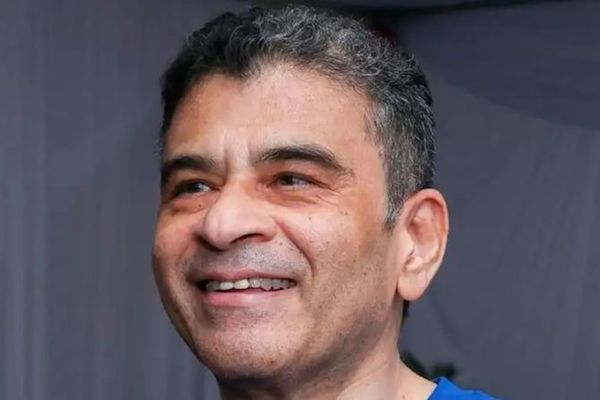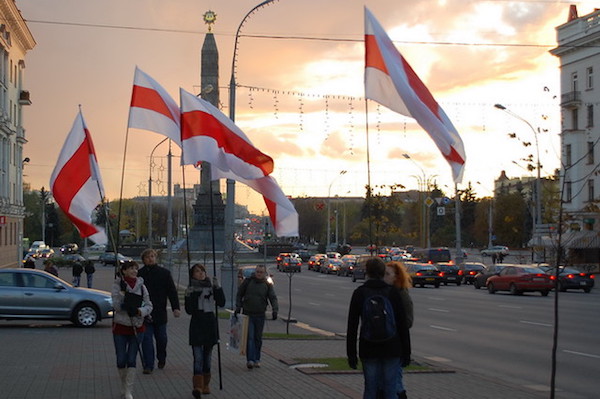A group of priests and lay Catholics from Belarus were allowed to attend last week’s World Youth Day festival, despite continuing repression three years after the contested re-election of President Alexander Lukashenko sparked mass protests and Western sanctions.
The Belarussian bishops’ website said around 150 Catholics had travelled to Portugal with Archbishop Yusof Stanevsky of Minsk-Mogilev, and had “prayed together and reflected on certain topics” with accompanying pastors, including integral ecology and care for the common home.
However, the opposition-linked ecumenical Christian Vision organisation said an elderly Greek Catholic from Vitebsk, Borys Khamayda, had been jailed for 15 days on the eve of the festival for decorating his ID with Belarus's banned traditional flag during a local pilgrimage.
Christian Vision said the country’s Catholics had faced “increased attention from the security forces” over the summer.
The Catholics make up around a tenth of Belarus's population of 9.4 million, but the Church has not publicly reacted to the mistreatment of citizens opposing Lukashenko’s 29-year rule since January 2021, when the Archbishop of Minsk–Mohilev Tadeusz Kondrusiewicz was made to retire after being temporarily barred from re-entering the country.
A report in May this year from Poland’s Catholic Information Agency listed 11 Catholic priests arrested during 2022, along with 13 Orthodox and Protestant clergy, and said Belarus’s bishops appeared “afraid to criticise human rights violations” for fear of “mass state repression”.
Meanwhile, Christian Vision reported that Fr Andrei Znoska, the rector of Lida’s Divine Mercy parish and a canon law advisor the bishops’ conference, was arrested on 19 July. The authorities did not provide a reason for arresting the priest and his whereabouts was unknown.
The organisation said another priest, Fr Yury Zhegarin, from Novogrudsk’s Church of St Michael the Archangel, had been fined and had his telephone confiscated after sharing a radio report on social media, while several clergy were beaten when security forces raided the Church of the Blessed Virgin Mary in Minsk following the arrest of a catechist, Vladislav Beladzed.
The capital’s landmark Catholic Church of Saints Simon and Helena, known as the Red Church, has been locked and barred since officials stripped it of sacred objects after a suspicious minor fire last September.
In June, two priests from Vitebsk, Fr Andrej Kulik and Fr Vyacheslav Adamovich, were also detained and had mobile phones and computers seized in connection with social media posts, which can carry severe penalties under Belarus's administrative code if deemed “extremist” by the regime.
Another priest, Fr Alexander Shautsov, from Belarus’s small Greek Catholic community, was jailed for 15 days for “spreading extremist material and violating public order”, but had his sentence later extended to 45 days, according to Christian Vision.
In a recent report, the government-backed US Commission on International Religious Freedom confirmed that despite two years of submissiveness by Church leaders, conditions were worsening for Christians in Belarus.
The estimated 1,300 political prisoners in the country include human rights campaigner Ales Bialiatski, winner of the 2022 Nobel Peace Prize.
Meanwhile, clergy arrests were not mentioned in the official communiqué from a Minsk meeting in May between Belarus's foreign minister, Siarhiej Alejnik and the apostolic nuncio, Archbishop Ante Jozic.
The statement said that Minsk and the Holy See had agreed to continue “active cooperation” and “an open and mutually respectful dialogue”.
Moscow has received military and logistical support for its war against Ukraine from President Lukashenka, whom Russian Patriarch Kirill of Moscow praised in a late July message for his contribution to Orthodox unity and “moral growth”, as well as to the “patriotic education of the young”.



 Loading ...
Loading ...